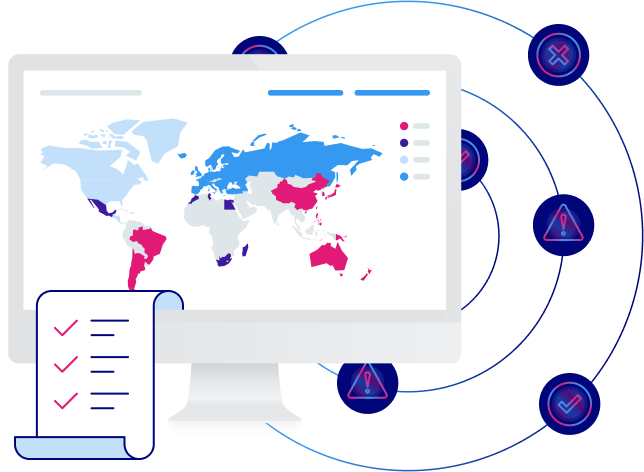-
Solutions
- AI Governance
- Responsible AI
- Geo-Specific Cookie Banner
- Consumer Preference Management
- Data Subject Request Automation
- Data Mapping and Vendor Risk Management
- Migrate
- Privacy, Vendor, and Risk Assessments
- Privacy Program Management
- Regulatory Guidance
- Privacy Program Consulting
- Certifications and Verifications
- International Data Transfers
Forrester TEI ROI of Privacy ReportTrustArc commissioned a Forrester study to analyze the potential benefits of using our platform and the Forrester team found ROI linked to efficiency, compliance, and decreased cost in data breaches.
Read the report -
Products Products Privacy Studio Overview
Automate consent and data subject rights compliance. Design seamless privacy experiences to enhance customer trust across your digital landscape.
- Cookie Consent Manager Effortlessly manage cookie consent for global compliance, ensuring a secure, personalized browsing experience.
- Consent & Preference Manager Easily manage and orchestrate customer consent and preferences across brands and channels.
- Individual Rights Manager Automate and streamline DSR workflows to ensure compliance and show your commitment to customer rights.
- Trust Center Centralize policies, disclosures, and trust-building information in a customizable no-code hub that speeds up deals.
Products Governance Suite OverviewStay ahead of privacy and compliance regulations. Simplify data privacy management and ensure data governance with cutting-edge apps.
- PrivacyCentral Centralize privacy tasks, automate your program, and seamlessly align with laws and regulations.
- Data Mapping & Risk Manager Gain full visibility and control of your data and accurately identify and mitigate risks.
- Assessment Manager Automate and score privacy assessments like PIAs and AI Risk, streamlining your compliance workflow.
- Nymity Research Get instant access to the latest in privacy regulations, legal summaries, and operational templates.
Products Assurance Services OverviewGain trust and credibility with leading privacy certifications from unbiased experts, backed by technology for unmatched privacy compliance assurance.
- Dispute Resolution
- TRUSTe Global CBPR and PRP Certification
- Data Privacy Framework Verification
- TRUSTe APEC CBPR and PRP Certification
- TRUSTe Responsible AI Certification
- TRUSTe Enterprise Privacy Certification
- CCPA/CPRA Validation
- GDPR Validation
- TRUSTe Data Collection Certification
- TRUSTe EDAA Privacy Certification
- Digital Advertising Alliance Validation
-
Regulations
- EU General Data Protection Regulation (GDPR)
- California Consumer Privacy Act (CCPA)
- Virginia Consumer Data Protection Act (CDPA)
- NIST AI Framework
- ISO/IEC 27001
EU Artificial Intelligence Act (EU AI Act)EU's regulation on the use of AI and the world's first comprehensive AI law.
Learn moreIndia Digital Personal Data Protection ActComprehensive data protection law governing the processing of personal data of Indian citizens.
Learn more - Resources
- Arc ✦
- Contact us
Oregon Consumer Data Protection Act
The Oregon Consumer Data Protection Act (effective July 1, 2024) empowers Oregon consumers with control over their personal information while imposing data privacy responsibilities on organizations entrusted with handling their personal information. This legislation amends ORS 180.095, known as the Department of Justice Protection and Education Revolving Account and outlines the obligations and standards of privacy protection that apply to covered entities.
Are you subject to the Oregon Consumer Data Protection Act?
The Oregon Consumer Data Protection Act applies to any organizations who do business in Oregon or provide products or services to Oregon residents and meet any of the following criteria during a calendar year:
- The personal information of 100,000 or more consumers, other than personal information controlled or processed solely for the purpose of completing a payment transaction
- The personal information of 25,000 or more consumers, while deriving 25 percent or more of the person’s annual gross revenue from selling personal information.
Obligations & Rights under the Oregon Consumer Data Protection Act
This data privacy and protection law requires organizations to provide control and transparency to Oregon consumers on how their personal information is collected, sold, and disclosed.
-
Consents & Opt-outs
Consumers’ consent must be obtained before data processing and allow the consent to be revoked as easily as it was given. Consumers must be presented with a clear and conspicuous link to a webpage or by other means where they may opt out of targeted advertising, the sale of personal information, and profiling.
-
Policies & Notices
Organizations must provide consumers with a reasonably accessible, clear, and meaningful privacy notice. This notice must include categories of personal and sensitive information collected and shared with third parties, the purposes of data processing, and instructions for exercising consumer rights. If the organization sells personal information or targets advertising, the notice must include opt-out methods for these activities.
-
Data Subject Rights & Requests
Consumers have the right to access, correct, delete, opt out of processing, and exercise data portability rights concerning their personal information. Businesses must be able to fulfill and address these requests without undue delay and within 45 days of receiving the request.
-
Vendor Management
Under this data privacy act, organizations must execute vendor contracts and conduct and document a data protection assessment for each of their processing activities that pose a heightened risk of harm to consumers.

US Consumer Privacy Handbook
From California to Maine, the flurry of US privacy laws makes managing a privacy program increasingly complex.
Achieve compliance
-
Guidance and operational templates Stay ahead of framework changes with expert guidance, ensuring your privacy program practices remain compliant and up to date. Operationalize quickly with expert written operational templates for sample policies, checklists, training, and more.
-
Mitigate risks Mitigate risks efficiently with TrustArc’s Assessment Manager. Utilize pre-built Data Protection Impact Assessments (DPIAs) and vendor assessments to ensure thorough risk management and compliance with industry standards.
-
Exercising individual rights Enjoy Data Subject Request (DSR) automation with TrustArc’s Individual Rights Manager. Easily operationalize individual rights according to specific jurisdictions, leverage automated workflows to save time, and keep an audit trail of requests/actions.

FAQs
- Does the Oregon Consumer Data Protection Act require data protection assessments?
- Are there limitations to the collection of personal information under the Oregon Consumer Data Protection Act?
- What is personal information and sensitive personal information under the Oregon Consumer Data Protection Act?
The information provided does not, and is not intended to, constitute legal advice. Instead, all information, content, and materials presented are for general informational purposes only.





